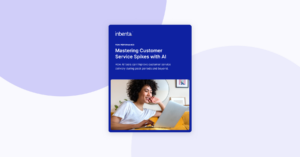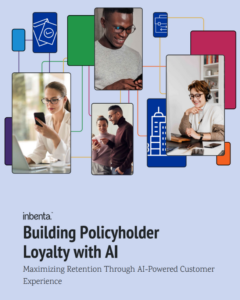With technological advancements, the way people now plan their travels has changed. As a consequence, travel companies need to adapt, find new ways to answer the travelers’ needs and improve customer experience if they want to attract new prospects or retain existing clients. In the same way as in other industries, chatbots are a very efficient way to tackle these challenges and help overcome these issues.
The tourism industry, an ever-changing sector
The face of tourism has evolved a lot in the past decades. Today’s travelers no longer go to their local travel agent in order to book their trips, they are more and more connected and digitally savvy, doing all their research online. As shown in a study conducted by Expedia, people end up visiting 38 websites on average while planning their travels and increasingly look for personalized offers and travel plans.
Along with the rise of instant messaging, this shift means that travelers are getting more demanding, wanting lots of information, personalized solutions and immediate answers to their questions for a streamlined travel experience.
“64% of travelers and 80% of business users expect travel companies to respond to them in real time.”
Salesforce
They don’t want to wait and the company that answers their need for immediacy, whilst meeting their budget, will most likely win the business.
As a consequence, the tourism industry needs to shift the way they engage with visitors and customers and travel companies need to keep seeking new ways to improve customer journey and make travel more convenient.
In this new context, automating some tasks becomes necessary and allows the tourism industry players to tackle some of the challenges posed by this new generation of travelers. Artificial intelligence and chatbots, which have positioned themselves among the digital marketing trends in recent years and have already proven their efficiency in various sectors, then become a viable solution to solve those issues.
Chatbot: what is it exactly?
Chatbots are computer programs capable of communicating and conducting conversations with humans through chat interfaces. They use Artificial Intelligence (AI) and Natural Language Processing (NLP) to do so, and are integrated with websites or messaging apps.
They help businesses automating their regular tasks and from the users’ point of view, they can be considered as a personal assistant who can respond to inquiries or give recommendations on a certain topic in a real-time manner.
When integrated into travel businesses, chatbots offer a lot of benefits pre-, during, and post-booking, for travelers as well as for companies using them.
Chatbots’ ease of use and practicality
Online bookings, and therefore queries prior to booking, can come from anywhere in the world, meaning different time zones and languages. Human agents are not always available to provide prompt customer support, whether it is at night, during the holiday season, or other peak travel period.
Chatbots, on the other end, are multilingual, offer instant responses, and 24/7 availability, which is ideal for customer-centric businesses such as travel companies, accommodation providers, or even destinations. They can, for example, transform visitor servicing in touristic places after hours, when travelers are arriving at a destination and the visitor information center is closed.
Another noticeable advantage of this self-service solution, bots use existing platforms or browsers that travelers already have on their phones, which means that they don’t need to download a separate app and clutter their device. As chatbots can be implemented on any channel or social network, travelers can approach your brand to seek recommendations, book flights and hotels via different channels like Facebook, Skype, Slack, Twitter, etc, thus increasing your chances of reaching your target audience.
Finally, users can ask questions in their own words and get a response rather than spending time searching for those answers on your website. Conversing is a much easier and pleasant experience to identify the best places to visit, restaurants to go to, etc…
Chatbots’ smart recommendations and personalized experience
Chatbots can be fine-tuned over time using the data collected through prior interactions with travelers. Coupled with AI and Natural Language Processing capabilities, the bot then becomes smarter and provides improved services and user experience.
It can for example comprehend vague queries such as “exotic beach destinations” and offer an elaborate set of services. It can also go further than just answering questions and suggest holiday spots to suit what the individual is looking for or be programmed to assist the traveler throughout his trip.
Increase conversion and build customers loyalty
Offering your target audience a 24-hours-a-day service the whole year round is already a source of satisfaction. With a chatbot, they don’t have to wait anymore for an operator to be available and they can solve their interrogations at any moment that suits them. Bookings and payments can also be processed within the chatbot itself, thereby providing a simplistic experience to the user. With this self-service solution, you increase your chances of converting these prospects into customers.
And if the bot doesn’t find the answer or gets asked something which requires a human to jump in, it can escalate to a live agent rather than your prospect closing his webpage or app and moving on to a different source of information.
“Once a customer has a personalised experience, they are 44% more likely to become a repeat buyer.”
Econsultancy
Collect data, obtain feedback and manage complaints
From a research perspective, chatbots record each of their communication with the users, thus allowing companies to do market research as they go and gather rich qualitative data from their customers. They offer real actionable insights into customers’ experience, purchase history, and problems – helping you refine, change, and develop travel products as you see trends emerging.
Chatbots can also be used to collect feedback from your customers by automatically sending reminders urging them to write reviews and submit ratings for your services. Post-trip, bots may send out feedback forms that can solicit valuable information on how your business could further improve a guest’s travel experience.
And if a complaint is identified, chatbots give users an alternative channel to privately address their grievances which, with the help of Artificial Intelligence, can be categorized and prioritized for easier handling. Designated employees can then address problems in the moment, before a negative review goes up on Google. And because you’ve automated the handling of routine queries, you’ve saved your customer service executives some precious time, allowing them to focus on more complex issues.
As we’ve seen it, chatbots come with multi-faceted benefits for tourism businesses. 24*7 availability, prompt response time, saved user history, unified user experience are some of the many benefits of chatbots. By helping travelers find the right info at the right time, avoid tiresome planning and simplify bookings, they provide a seamless and hassle-free experience to the users, thus making them stick to your brand. By automating some tasks, your business can also concentrate on other areas of opportunity such as analyzing emerging travel trends, mapping out plans to increase repeat business gaining loyalty for future travels.











